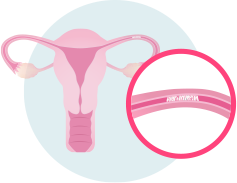
Blocked fallopian tubes prevent an ovulated egg from interacting with sperm, thereby inhibiting fertilization.
They also prevent a fertilized egg from traveling to the uterus, preventing implantation.
Many problems, including infection, endometriosis, pelvic adhesions, and even normal menstrual flow can cause a tube to be blocked.

Tubal occlusion is quite common, as evidenced by the fact that approximately 15-20% of the patients seen at Texas Fertility Center suffer from this condition. All too often, they don’t even know that they have it.
Any fallopian tube disease – even without complete obstruction – increases the risk of having a tubal pregnancy. The risk is increased from 1% in the general female population to approximately 20% for women who have fallopian tube disease.
Fortunately, many patients with tubal disease have several treatment options available to them – all of which can lead to successful conception and delivery of a healthy baby.
Causes and symptoms of blocked fallopian tubes
Your TFC fertility specialist will look for indications of blocked tubes in your health history, and will specifically look for common causes, including:
- Endometriosis
- Pelvic inflammatory disease
- Sexually transmitted disease
- Unexplained infertility
If you have a history of increasingly severe pain or cramping with your periods or with intercourse, previous abdominal or pelvic surgery, or a history of any pelvic infection, we will most likely recommend a laparoscopy to further evaluate your fallopian tubes.












